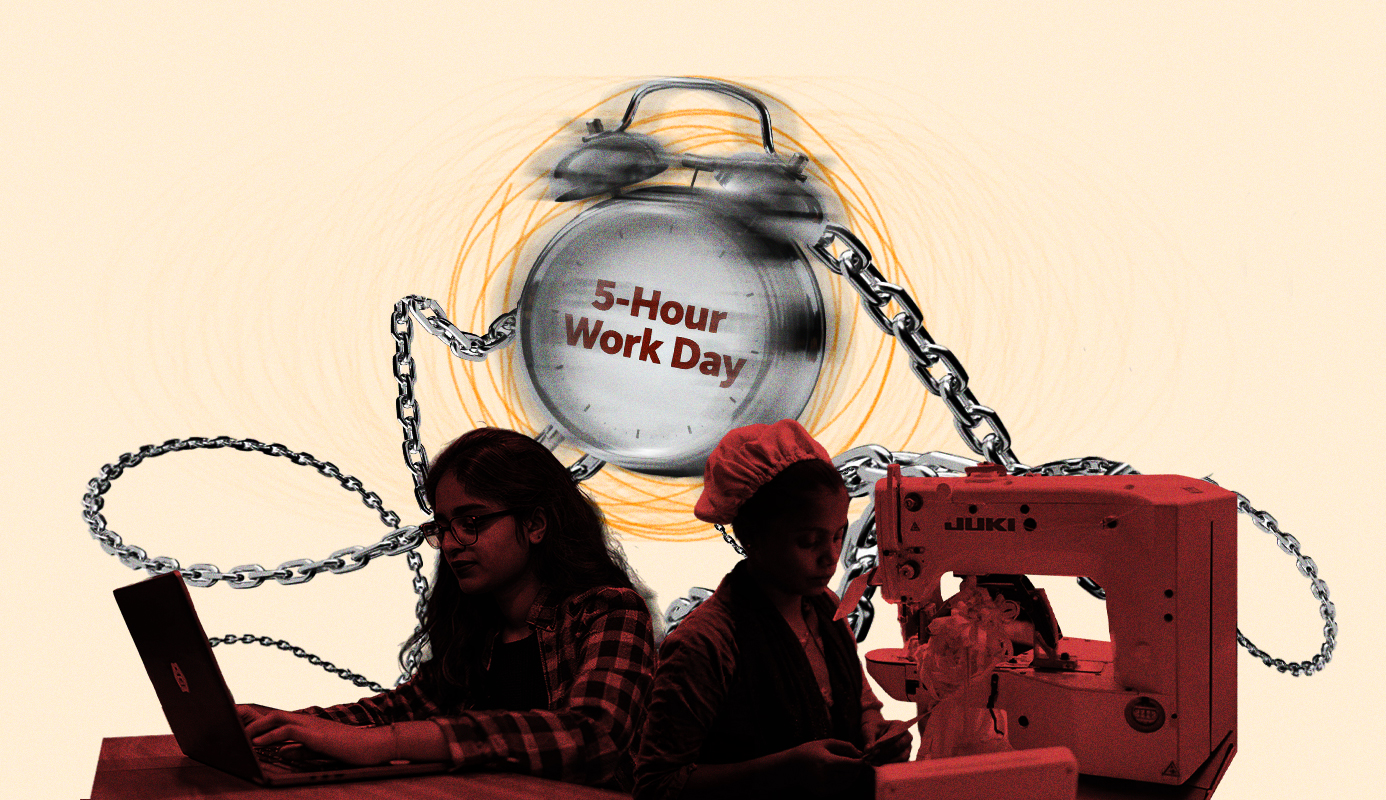Full pay, half freedom, complete upheaval

Apparently, salvation for Bangladeshi women has arrived. Jamaat-e-Islami has declared that, under their rule, women will work five hours a day and still receive a full day's pay. Employers will pay for five, and the government will foot the bill for the remaining three. Because nothing screams women's empowerment quite like being paid to work less. Let us take a moment to applaud this grand gesture. Women will finally have time to rest, they say. Rest from what, exactly? The office? The factory? Or the unpaid double shifts they work every day at home?
For centuries, Bangladeshi women have been the country's invisible economic engine. They have built households, raised children, cooked meals, and cared for the sick without clocking out or cashing in. Their labour has been missing from every GDP calculation, every national budget, and every line of economic policy. And now, the political solution seems to be to pay women for staying home. I am sure our grandmothers are thrilled. These are the women who kept entire households running through famine, war, and political upheaval. They managed to make ends meet with ration cards, borrowed rice, and sheer determination. They did not need five-hour shifts. They deserved recognition.
Our mothers, too, have been the silent infrastructure of our lives. When a woman in Dhaka goes to work, five other women make that possible. Her mother cooks, her grandmother picks up the children from school, her sister supervises homework, her mother-in-law cleans the house, and her neighbour keeps an eye on the stove when the gas runs low. For every woman who steps out, there is a small army of other women holding the fort behind her. And now, we are being told to go home. We are told it is progressive, even compassionate. It is apparently for our honour and well-being. Because heaven forbid women get too used to public spaces, financial independence, opinions, or options. Better to tuck them back into the domestic comfort zone with a full day's pay and a pat on the head.
It is all wrapped neatly in the vocabulary of care. The word "honour" is being thrown around again, that sacred Bangladeshi word which has excused everything from child marriage to silencing women on talk shows. Women are being told that they are valued, but only in carefully contained portions. Work, yes, but not too much. Speak, but not too loudly. Exist, but within limits. This pseudo-progressive idea is dressed up as benevolence, but it reeks of regression. You cannot put women in the workforce for decades, rely on their labour to prop up the economy, and then hand them a symbolic half-day like it is a bouquet of roses. Women are not tired of working; they are tired of being patronised.
It is also economically absurd. If the government wants to spend public money on women, perhaps start by making buses safe, factories humane, and workplaces fair. If the state really wants to honour women, how about enforcing harassment laws so that women can travel without fearing for their lives or dignity? But no, instead we get a political bedtime story. In this version of equality, women are delicate flowers who must be shielded from the exhaustion of an eight-hour workday. Their freedom is measured in coffee breaks, and their dignity is apparently restored by working less.
If we follow this logic, maybe next the government can introduce the "three-hour honour package" for working mothers, or a special "one-hour premium" for those who promise to stay extra modest. Perhaps we could also establish a Department of Dignity, staffed entirely by men, to determine exactly how many hours of freedom women can handle without upsetting the moral fabric of society. Sarcasm aside, this is not about kindness. It is about control. Reducing women's visibility in the public sphere, under the pretext of protecting them, has always been a favourite tactic. Because once women start showing up, they also start speaking up. And that is when things get inconvenient.
Our mothers and grandmothers stepped in so that we could step out. They carried the unpaid weight of the household work so that their daughters could study, work, and build lives that stretched beyond the kitchen. They were the scaffolding of progress. And now, the scaffolding is being asked to pack up and go home, along with the building. A five-hour workday is not a gift. It is a leash tied with a silk ribbon. It tells women that they are only welcome in the workforce as long as they do not take up too much space, time, or power.
And for those who argue that this is a choice, let us be honest. There is no real choice when social norms and political rhetoric tell you that "good women" prioritise family over ambition. There is no freedom when staying home is framed as virtue and going out is framed as defiance. If Jamaat truly wanted to empower women, it would address the issues that keep women unsafe and underpaid. They would protect women like the one on that bus in Dhaka, who fought off harassment with nothing but her shoe while other passengers sat silent. They would build systems that respect women's work, not policies that reduce it.
Instead, we are being offered what looks like progress but smells like nostalgia for a time when women knew their place. The irony is that every woman who makes it to the workplace does so because generations of other women made sacrifices to get her there. And now, after all that effort, we are being told that progress means clocking out early. If this is empowerment, then patriarchy must be laughing somewhere in an air-conditioned office, collecting a full day's pay for half a day's work. Bangladeshi women have already worked enough unpaid shifts for one lifetime. They do not need shorter hours. They need respect, safety, and equality—not the illusion of it.
Barrister Noshin Nawal is a columnist for The Daily Star. She can be reached at nawalnoshin1@gmail.com.
Views expressed in this article are the author's own.
Follow The Daily Star Opinion on Facebook for the latest opinions, commentaries, and analyses by experts and professionals. To contribute your article or letter to The Daily Star Opinion, see our guidelines for submission.




 For all latest news, follow The Daily Star's Google News channel.
For all latest news, follow The Daily Star's Google News channel. 

Comments